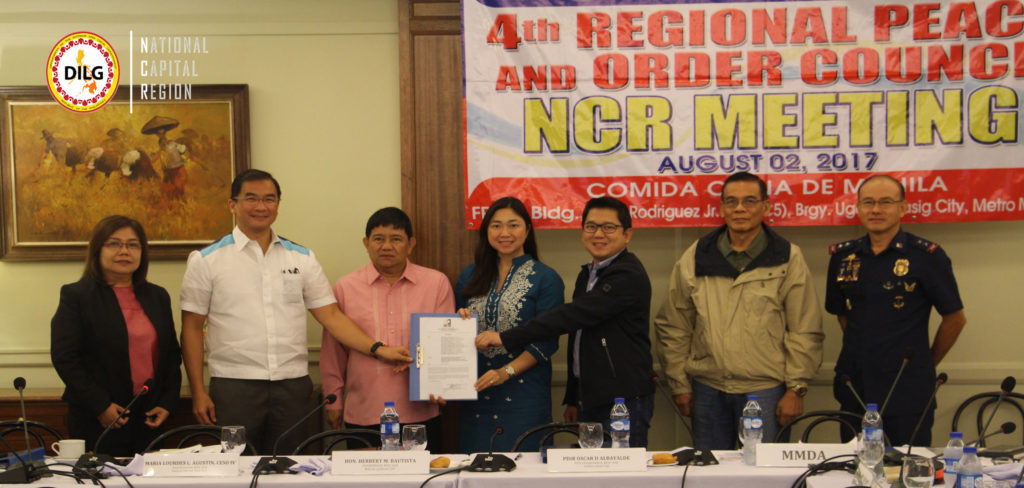
The Regional Peace and Order Council-NCR (RPOC-NCR) has officially endorsed to the Department of Health the Community-Based Drug Rehabilitation Program (CBDRP) Policy that it has created.
The turnover, held in the fourth RPOC-NCR regular meeting hosted by Pasig City, was due to the shift of policy and change of roles of national government agencies in the fight against illegal drugs. Initially, the implementation of CBDRP policy was tasked to be led by the LGUs, but was shifted to DOH as lead agency for rehabilitation.
RPOC-NCR Chair Quezon City Mayor Herbert Bautista, together with Vice Chair PNP NCRPO Chief Oscar Albayalde, RPOC Head Secretariat DILG-NCR Regional Director Maria Lourdes Agustin, Pasig City Mayor Robert Eusebio and Taguig City Mayor Laarni Cayetano handed the document to DOH-NCR Regional Director Ariel Valencia.
RPOC-NCR formulated and adopted the CBDRP policy in the first semester of the year; DILG-NCR as the Councilâs secretariat led the drafting of the policy, together with representatives of select NGAs, key local functionaries and religious sector.
RPOC-NCRâs CDBRP Policy provides the guidelines in implementing CBDRPs, where roles and functions of NGAs, civil society organizations (CSOs) and religious groups and other community-based organizations are defined to avoid overlapping of roles and ensure effective utilization of resources for anti-illegal drugs initiative.
It is also seen to promote a uniform system for community-based rehabilitation for easier coordination among LGUs in the region.
Under the policyâs framework, LGU drug rehabilitation programs shall have a duration of at least six months, and includes clinical services which focus on the physiological and physical aspect of the surrenderer; psycho-spiritual services for values and spiritual formation; and sustainability program services which focuses on education, skills and livelihood. These will be covered in 24 counselling sessions, with progress monitoring for every client. DOH accredited physicians will lead drug dependency examinations of surrenderers.
Unannounced random drug testing in the course of treatment is also part of the framework, as well as the awarding of certificate of completion of sessions for individuals that have successfully fulfilled the program.
The policy also provides for the strengthening of anti-drug abuse councils in the city and barangay level, with the provision of logistical support. It also encourages LGUs to enact legislative measures for sustainability of CBDRPs in their localities.
A monitoring and evaluation mechanism is also included, which will be submitted to the Council through DILG-NCR, as its secretariat. Agencies involved in the CBDRP are also required to meet every quarter for updates as well as review of the policy.
Apart from the turnover of the CBDRP policy, the meeting also became a venue for the discussion of the ASEAN Lighting Ceremony, in celebration of the 50th Anniversary of the foundation of the organization which the country is currently hosting.
